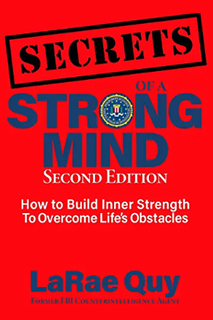As an FBI agent, I quickly learned that the “needs of the Bureau” would always come first. Transfers, assignments, and caseloads were handed out with little or no consideration for how they would impact the agent. We were given jobs that often seemed impossible to fit into one day (or one week), with little regard to the number of hours required to complete them.
Yet morale was always high. Sure, we complained and moaned at the inconvenience and joked that we’d crush under the weight of our responsibilities, but here was the thing: our values were in alignment with those of the FBI. As a result, our wellbeing never suffered even when working 24/7 on a child abduction, thwarting a terrorist threat, or building firewalls around a sensitive computer system.
These were essential investigations, and the results mattered. Our wellbeing never suffered because we believed in our mission—to protect American citizens. We got it right, more often than not, and we were always ready to fight the next challenge. We were doing well as individuals, despite the heavy workload.
The FBI’s defining values are Fidelity, Bravery, and Integrity; however, there are others such as honesty, compassion, fairness, courage, and diligence, to name a few. We applied those values, first to ourselves and then to others.
Following clearly defined values makes a powerful impact, and it ripples into even wider circles because values are how we define our world. They are the foundation upon which we base our judgments on what is critical in life.
It can take a strong mind to sort through the noise that competes for our attention. Are you mentally tough? Take this evidence-based, FREE Mental Toughness Assessment.
What does that mean for today’s leaders when the workforce faces economic uncertainty, soaring energy prices, and a lingering pandemic that can all threaten their sense of wellbeing?
The way we behave, how we live and work, and our relationships with ourselves and others are all guided by the right values. Good values are the fundamental principles that provide us clarity of purpose, which nurtures wellbeing and gives us confidence because we live a meaningful life.
Here is how the right values help increase your wellbeing:
1. Love and take care of yourself

We may get tired of the repetitive airline briefings before flight take-off, but we must pull the oxygen mask over our own faces before we try to assist the folks around us.
Thich Nhat Hanh once said, “Until we are able to love and take care of ourselves, we cannot be of much help to others.”
Unfortunately, self-care and narcissism have become conjoined in the minds of most people these days. Selfies and photos of our excellent life glut our social media feeds.
We justify our “look at me” approach to life by reminding our critics that we want to connect with others. That’s great, but in our constant rush to project a carefully curated image of ourselves, we find ourselves connected to everyone except ourselves.
Most people believe they are self-aware. They know how they think, feel, and where they’re headed. But that is a bandaid approach because self-love and self-respect require more than the fickle psycho-babble that passes for self-help wisdom.
When we aren’t in touch with who we are and what makes us tick, our focus becomes superficial, roots are shallow, goals are self-centered, and values turn out to be poor imitations of how other people live.
You are the most important person in your life. This is not self-centeredness; it is survival at its most basic level. Until you tend to the temple that is your mind and body, it won’t be easy to love and be of service to others.
Our addiction to busyness and constant entertainment is not the real culprit—it’s our aversion to spending time with ourselves. We’d rather do anything than simply be, which is why meditation is both so hard and so important.
We can continue to ignore the twisted crap that makes up memory and conscience for a while, but it tends to rear its ugly head when we feel overwhelmed or stressed.
Ignorance of your competition makes you vulnerable; ignorance of yourself makes you stupid—LaRae Quy
How To Make It Work For You: Spend some time in solitude. Stop using the world’s noise to block out the discomfort of being yourself. You’re human, meaning there’s a bit of sand mixed in with the gold. When you surround yourself with moments of solitude, you become more familiar with your interior environment. The layers start to peel back. Don’t be alarmed if some of the ugliness begins to surface because true wellbeing allows you to look honestly at the good, the bad, and the ugly. It’s for you to examine the root causes of your thoughts and feelings and decide when and how you can scrap the parts that continue to weigh you down.
2. Recognize your own values
We all value something, but naming our values isn’t as easy as it sounds because it requires us to closely examine what governs our behavior. We may feel that we value a principle but we don’t really if we don’t incorporate it into the way we treat other people, or even ourselves!
For example, we may say that we value the environment, but our lifestyle suggests otherwise. Likewise, we may value loyalty but find it easy to ditch a friend, family member, or colleague when the chips are down or when it becomes inconvenient.
Values can change over time. While finances may not have been at the forefront in your younger life, now that you have a family, money becomes more important. You may find you value adventure more as your life’s circumstances change.
You must continually check in with yourself to ensure you’re still in touch with your North Star. What gives you meaning? What brings joy and contentment? If the answer to those questions revolves around material possessions and the power you exert over others, you’re still in second grade as a human being.
In other words, you don’t have the right values.
The more we are aware of our values and their importance, the more constantly and effectively we will put them into practice. The more we practice the right values, the more positive impact we have on the wellbeing of ourselves and those around us. Every action does make a difference.
How To Make It Work For You: Reflect on the past week and identify:
- A time you felt good about something you did.
- A time you felt wrong about something you did.
- When you admired your behavior or reaction.
- When you disliked your behavior or reaction.
- An occasion when you admired someone else’s behavior.
- An occasion when you disliked someone else’s behavior.
In short, identify what qualities you are responding to and then reflect on how they impact your wellbeing.
3. Help employees find value in their work

Hard-working and talented employees will leave if they don’t feel the company respects their values. When leaders invest in employee wellbeing, they signal that they care whether the employees are flourishing in their situation.
As a leader, your job is to make sure you’re leading with good values and that you make them known in your workplace.
Maybe not every employee will share your values or that of the organization, but when you place importance on their wellbeing you show respect for what is important to them. This helps improve staff retention and morale.
To make it easier for you as a leader, start with the hiring process to ensure that the people you hire are not only competent but also savvy about what is important to them. Then, when you lead with the right values, and clearly enunciate them, the rest will fall into place.
Values and wellbeing go hand in hand.
In today’s changing workplace landscape, it’s not uncommon for several generations to be working together. Each has different expectations and perhaps different values as well. To bridge those gaps, let them know you care about their wellbeing and how they are doing.
How To Make It Work For You:
1) Refrain from pushing outcome-only metrics over other kinds of performance measures.
2) Seek out former employees who can give an honest account of your workplace. Does wellbeing matter, or is the organization playing lip service?
3) Help your employees think more deeply about the consequences of their actions—or inaction—by creating an environment where these discussions are welcome and supported by leadership. Bring in professionals who are capable of making those discussions realistic and constructive. This will assist them in identifying good values that will provide them with a sense of wellbeing.
Featured image from Unsplash
© 2023 LaRae Quy. All rights reserved.
You can follow me on Twitter, Facebook, Instagram, AND LinkedIn
Are you mentally tough? Take this evidence-based, FREE Mental Toughness Assessment.
Check out my new online training program at www.SecretsOfAStrongMind.com
Get my book, “Secrets of a Strong Mind (second edition): How To Build Inner Strength To Overcome Life’s Obstacles”

Author of “Mental Toughness for Women Leaders: 52 Tips To Recognize and Utilize Your Greatest Strengths”



Recent Comments